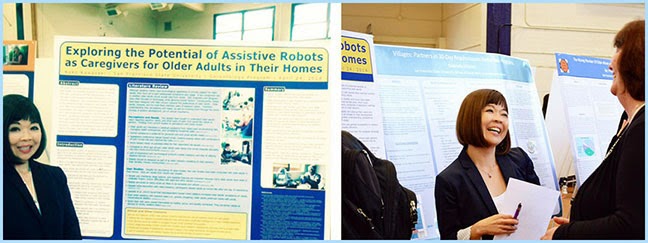It's been a very long time since my last post! I graduated from school last May, and life has kept me busy! Throughout the year, I had many different ideas on what to write about, but I haven't posted any of them (obviously). Nonetheless, writing and sharing are always on my mind, and lately I've been thinking about my early encounter with dementia as I witnessed my father's dramatic behavior changes. Here is my experience:
Between 2005
through 2010, I was a caregiver for my late father who had multiple chronic
health conditions. To complicate matters, my father was developing dementia,
but I did not realize this. I had no knowledge of what dementia was, and could
not understand why my father’s personality had changed so dramatically. Even
though my mother lived with him, she was also struggling with her own health
challenges. With each visit, I was beginning to notice changes in my parents’
living environment such as overdue billing statements, unused medications,
burned pots and pans, and unlocked doors. These changes were worrisome and
often kept me up at night. Thus I decided to step in and help my parents. The
following paragraph describes my early experience in witnessing my father’s
behavior, which I now recognize were symptoms of dementia.
In 2005, my father started to exhibit behavior that was very strange. When he wanted to go to sleep, he would ask my mother to help him. (He had multiple strokes over the course of 10+ years, so he needed assistance with getting into bed at night.) My mother would proceed to tuck him in, and go back to the family room to watch television. A few minutes later, my father would come back and ask my mother to help him to bed. She would repeat the same process, and then moments later, he would come back again to ask for help into bed. He would continue with this behavior repeatedly. It would continue for at least 2-3 hours, every single night! My mother, in frustration, would ask him why he keeps coming back to the family room only to ask to be put to bed again. In response, my father would just look at her with a slight grin on his face and say nothing. Then, he would continue the back-and-forth routine. Although irritated, my mother did not question why my father behaved this way. She simply thought it was another one of her husband’s quirks. When I observed this situation, I thought that there was something seriously wrong, but I couldn’t understand what it might be. My father’s behavior was so out of character that it made me feel uncomfortable. This situation lasted for several months, and it stopped when my father had another stroke. New behaviors (i.e., making inappropriate comments, having emotional outbursts), however, were beginning to emerge.
I have many old notes on my experiences as I struggled to help care for my father. I hope to share them now and again, and perhaps it could help spark meaningful conversations. I would love to hear from you about your thoughts and experiences. Thanks for visiting my blog! Have a wonderful, healthy holiday season!
 |
| At the Beach: Father posed for the camera as I collected seashells. |
In 2005, my father started to exhibit behavior that was very strange. When he wanted to go to sleep, he would ask my mother to help him. (He had multiple strokes over the course of 10+ years, so he needed assistance with getting into bed at night.) My mother would proceed to tuck him in, and go back to the family room to watch television. A few minutes later, my father would come back and ask my mother to help him to bed. She would repeat the same process, and then moments later, he would come back again to ask for help into bed. He would continue with this behavior repeatedly. It would continue for at least 2-3 hours, every single night! My mother, in frustration, would ask him why he keeps coming back to the family room only to ask to be put to bed again. In response, my father would just look at her with a slight grin on his face and say nothing. Then, he would continue the back-and-forth routine. Although irritated, my mother did not question why my father behaved this way. She simply thought it was another one of her husband’s quirks. When I observed this situation, I thought that there was something seriously wrong, but I couldn’t understand what it might be. My father’s behavior was so out of character that it made me feel uncomfortable. This situation lasted for several months, and it stopped when my father had another stroke. New behaviors (i.e., making inappropriate comments, having emotional outbursts), however, were beginning to emerge.
I have many old notes on my experiences as I struggled to help care for my father. I hope to share them now and again, and perhaps it could help spark meaningful conversations. I would love to hear from you about your thoughts and experiences. Thanks for visiting my blog! Have a wonderful, healthy holiday season!





